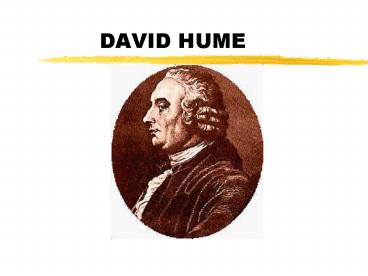DAVID HUME - PowerPoint PPT Presentation
1 / 15
Title:
DAVID HUME
Description:
Two sorts of matters of fact (IV, I, 3) Known by ... from experience (matter of fact) ... there have been miracles is a claim about a matter of fact ... – PowerPoint PPT presentation
Number of Views:79
Avg rating:3.0/5.0
Title: DAVID HUME
1
DAVID HUME
2
David Hume (1711-1776)
- Hume and the Enlightenment
- The project of epistemology what can we know?
- Hume and Descartes
3
Two Kinds of Knowledge
- Relations of ideas (IV, I, 1)
- A priori (thought)
- Not about the world
- Matters of fact (IV, I, 2)
- a posteriori (experience)
- About the world
4
The Basis of Empirical Knowledge
- Two sorts of matters of fact (IV, I, 3)
- Known by immediate experience
- Known by reasoning from immediate experience
- Basis of reasoning from immediate experience
cause and effect (IV, I, 4)
5
Knowledge of Cause and Effect
- Humes question How do we know that a given
cause has a given effect? (IV, I, 6-11) - Not by purely logical reasoning (relation of
ideas) - Therefore, from experience (matter of fact)
- But how does experience give us knowledge that C
causes E? (IV, II, 1)
6
The Problem of Induction I
- We believe that C causes E because of our past
experiences of C being followed by E - But do past experiences support conclusions about
the future? - Only if we know that the future will (probably)
be like the past. - But how do we know this?
7
The Problem of Induction II
- Two ways of knowing that the future will be like
the past - A priori (reasoning) no, because future might
not be like the past (IV, II, 5) - A posteriori (experience) no, because that begs
the question (IV, II, 6)
8
Humes Conclusions
- We have no basis for believing that the future
will be like the past (IV,II, 8) - Belief that the future will be like the past is
based merely on custom, not knowledge (V, I, 5-6) - Therefore, beliefs in causality are likewise
based merely on custom - Therefore, so are all beliefs about the world
that go beyond immediate experience
9
Is Hume a Skeptic?
- Yes, in the sense that he claims there is no
justification (rational argument) for our beliefs
about the world. - No, in the sense that he denies the need for any
justification of these beliefs.
10
Miracles and Religious Belief
- Humes empiricist approach
- The claim that there have been miracles is a
claim about a matter of fact - Claims about a matter of fact must be settled by
an appeal to experience - Conclusions based on experience have degrees of
certainty (probability) depending on the amount
of evidence supporting them.
11
Miracles and Testimony
- Testimony the main source of evidence for
miracles - Testimony evaluated by
- Reliability of the witness
- Probability of the claim made
12
The Probability of a Miracle
- Miracle violation of a law of nature
- Law of nature a uniformity supported by all our
past experience - Probability likelihood of an event given past
experience - A miracle is contrary to all past experience and
therefore is maximally improbable
13
Should We Believe Testimony of Miracles?
- 1. The intrinsic probability of a miracle is
maximally low. - 2.The probability that a witness to a miracle is
wrong is not maximally low. - 3. Therefore, it is more probable that a witness
to a miracle is wrong than that the miracle
occurred. - 4. Probability is the guide to what we should
believe about matters of fact. - 5. Therefore, we should not believe any report of
a miracle.
14
The Force of Humes Argument
- Does not deny that miracles are possible.
- Does not say that no miracles have ever occurred.
- Does not say that we could not have good reason
for believing that a miracle has occurred. - Does say that we have no good reason to believe
any actual reports of religious miracles.
15
Some Responses to Humes Argument
- Deny that miracles are violations of laws of
nature - Deny that factual beliefs should always be based
on probability - Recognize that faith is the basis for accepting
miracles not vice versa






![[PDF]❤️DOWNLOAD⚡️ Hume on Motivation and Virtue (Philosophers in Depth) PowerPoint PPT Presentation](https://s3.amazonaws.com/images.powershow.com/10051110.th0.jpg?_=20240608121)
![[PDF]❤️DOWNLOAD⚡️ Hume on Motivation and Virtue (Philosophers in Depth) PowerPoint PPT Presentation](https://s3.amazonaws.com/images.powershow.com/10050578.th0.jpg?_=202406071112)























